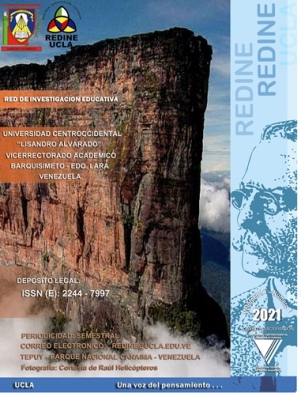Use of the canaima educational tool from the perspective pedagogical for primary education teachers
Keywords:
Canaima tool, pedagogical perspective, teacherAbstract
The purpose of this research is to: Interpret the meaning of the Canaima Educational Tool from the pedagogical perspective of Primary Education Teachers of the EB “Manuel Cedeño”, Peña Municipality, Yaracuy state, for which the following purposes were established: (a) Explore the reasons that lead to the use of the Canaima Educative tool from the pedagogical perspective of primary school teachers. (b) Describe the factors that influence the pedagogical use of the Canaima Educative tool by primary school teachers; and (c) Unveil the use of the Canaima Educative tool from the pedagogical perspective of Primary Education teachers. Likewise, this proposal was methodologically framed in the interpretive paradigm, with a qualitative approach, under the phenomenological method supported by hermeneutics, and the research line Information and Communication Technology. Contributing to generate new contributions by interpreting the pedagogical use of the Canaima Educative tool, under an innovative and constructivist conception that is in accordance with the new educational trends and environment in which the student operates
Downloads
References
Cáceres, J. (2003). Praxis docente en la educación venezolana. Edit. Unilyt. Valencia.
Crespo Suárez, E. (2003). El construccionismo y la cognición social: metáforas de la mente. Política Y Sociedad, 40(1), 15 - 26. Disponible en: https://revistas.ucm.es/index.php/POSO/article/view/POSO0303130015A
Farías, J. (1999). Sociedad de la información y Educación (libro electrónico). Disponible en: www.ub.edu/prometheus21/articulos/obsciberprome/blanquez.pdf (Consulta, 2019: marzo, 12)
Fernández, S. y Díaz, S. (2002). Unidad de investigación. Universidad de Coruña España.
Husserl, E. (1969). La fenomenología crítica de la matematización y el sentido de la responsabilidad. Edit. Springer.
Leal, J. (2005). Autonomía del sujeto investigador. Valencia. 1° edic.Edit. Océano azul.
Leal, J. (2009). Autonomía del sujeto investigador. Valencia. 2° edic. Edit. Océano azul.
Ley Orgánica de Educación y su Reglamento (LOE, 2009). Disponible en: www.oei.es/quipu/venezuela/Reglamento_ley_org_educ.pdf . (Consulta, 2015: Agosto, 10)
Ministerio del Poder Popular para la Educación (MPPE- 2007). Diseño Curricular. Sistema Educativo Bolivariano Nacional
Martínez, M. (1992). La Crítica de la Razón Pura. Edit. Trillas. México
Monasterio, L. (2009). Capacitación docente y actitudes hacia el computador. Disponible en: www.Investigacion.ilce.edu.mx/panel_control/doc/c36,act,intro,d1.pdf . (Consulta, 2019: Noviembre, 25)
Taylor, S. y Bogdan, R. (1986). Introducción: ir hacia la gente”, en Introducción a los métodos cualitativos de investigación. México, Paidós
UNESCO (2009). La UNESCO y la educación. Disponible en: www.unesdoc.unesco.org/images/0018/001849/184967s.pdf . (Consulta, 2019: Noviembre, 11)
Published
How to Cite
Issue
Section
Derechos del/de autor/es a partir del año de publicación
Esta obra está bajo la licencia:
Creative Commons Reconocimiento-NoComercial-CompartirIgual 4.0 Internacional (CC BY-NC-SA 4.0)
Las opiniones expresadas por los autores no necesariamente reflejan la postura del editor de la publicación ni de la UCLA. Se autoriza la reproducción total o parcial de los textos aquí publicados, siempre y cuando se cite la fuente completa y la dirección electrónica de esta revista. Los autores(as) tienen el derecho de utilizar sus artículos para cualquier propósito siempre y cuando se realice sin fines de lucro. Los autores(as) pueden publicar en internet o cualquier otro medio la versión final aprobada de su trabajo, luego que esta ha sido publicada en esta revista.




